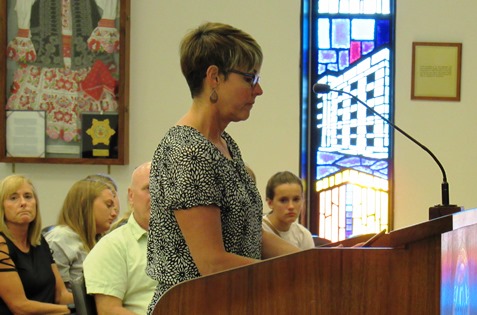
District attorney and staff to get a raise; more tax cuts defeated; UG to borrow money to demolish homes; money added to pay for police body camera maintenance
by Mary Rupert
The Piper Soccer Club and Piper swim team made a plea for parks facilities to the Unified Government Commission at the UG budget public hearing Monday night, July 24.
Fonda Telthorst told the commission that the Piper swim team favors the building of an aquatic center. Around 20 people, including teams, attended the meeting in support.
“One of the ways to attract families, taxpaying citizens, is to make sure that their tax dollars are not only paying for essential necessities, but also for family-friendly amenities,” Telthorst said. She asked the commission to seriously explore building an aquatic center.
She gave several reasons to support the initiative:
• It would be directly related to the UG’s health initiative;
• Swimming can provide physical activity for people of all ages;
• Access to lessons, water aerobics, water exercise, recreational swimming and therapeutic swimming are beneficial;
• Access to a water center is appealing to current and future homeowners;
• Instead of traveling to surrounding counties, revenue would stay in Wyandotte County; and
• The Piper swim team has many volunteers and more than 120 youth participants. Their rented facility is too small for the team, she said.
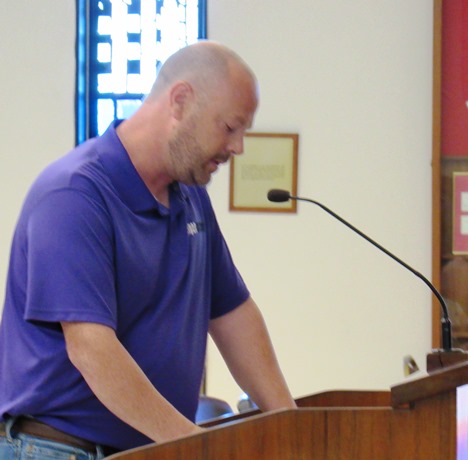
Mark Sorenson, a coach of the Piper Soccer Club, said a new athletic facility with fields was needed. The soccer club has 37 teams with more than 450 kids, he said.
Currently, the team must rent fields, and if it wants to hold a tournament, it must go outside of the county, he said. The club needs funds to build a practice field, he said.
Another Piper resident also said the Piper swim team supported the building of an aquatic center – although a later speaker referred to it as possibly a splash park.
The group has proposed using the former go-kart property near K-5 and Wolcott Drive for soccer fields and an aquatic center. The property now is owned by the UG. It was described in earlier meetings as a proposed community park with athletic fields and walking trails. The site is located in a flood plain.
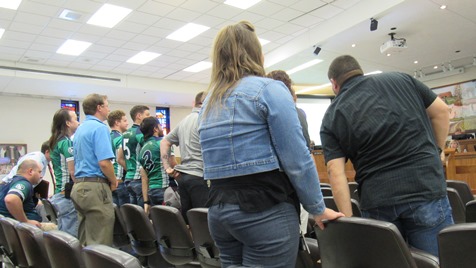
Chris White, a resident, said there are few very, if any, parks located in the Piper area, west of I-435. He said the group has grant money, and is working with companies to find donations without burdening the taxpayers.
Wyandotte County Lake Park, at 91st and Leavenworth Road, is on the east side of I-435, and it is about 4 miles from the Piper Elementary School, and about 3.5 miles from Piper High School.
Jill Gonzalez also said the group was actively seeking donations that would be used toward costs of the facility. In addition, there are many volunteers available to help with the upkeep. She said all work can be done in phases, through donations, if necessary.
“We are actively seeking money and doing this on our own,” she said. In addition, they would like to work with the UG Parks and Recreation Department on it, she added. They are in talks with another Piper independent group about using the fields for football practices, she added.
“Families could come out and safely walk,” she said. She added it was a huge opportunity to use land that is not now being used, and it would benefit children and athletic groups.
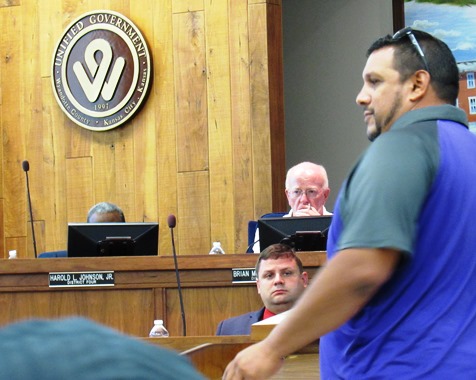
Mike Gonzalez said there are discussions about bringing children from all parts of Wyandotte County into this program.
Kevin Winters of the Kansas City Gaelic Athletic Club told the commission there were a number of adult amateurs who practice in Wyandotte County parks, and who could also use fields here.
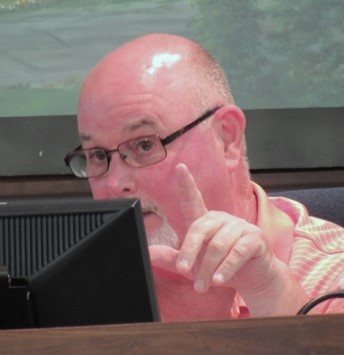
UG Commissioner Mike Kane has requested $100,000 be set aside in the budget for the soccer fields and park development in Piper.
Most of the residents speaking at the public hearing were there to support the Piper park proposal. Another resident, Dan Welch, was there in support of parks in general.
Marcia Rupp, a resident, was the only one speaking on another topic than parks. She told the commission that some business areas along State Avenue near Indian Springs appeared to be run down and needed to be improved before any other businesses will locate there, and she urged the UG to take action.
The administrator’s recommended changes at the budget meeting held after the hearing included the Piper park project.
Doug Bach, administrator, recommended using part of the $100,000 that comes from the casino funding towards parks and recreation. The money was previously set aside for playgrounds for the disabled, and Bach said that program would not be affected. Bach said there was enough money to work on the playground project from grants and other funds, and so he could move the $100,000 to 2018.
He recommended putting $50,000 toward planning and design for recreation centers and $50,000 for planning and design for the park in the Piper area in the fiscal year 2017 budget.
The recreation center that is being considered for the $50,000 grant is the Beatrice Lee Center, formerly John F. Kennedy Recreation Center, according to Bach, although he hopes there is enough money to get another recreation center in the study, as well. Commissioner Harold Johnson asked for the funding to be dedicated to the Beatrice Lee Center.
The planning and design study will discover what costs there are to the Piper project, looking at the site to determine what needs to be worked on, according to Bach.
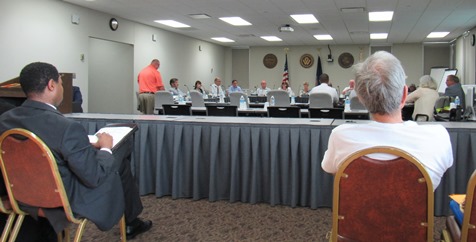
Effort to reduce taxes another 2 mills defeated
An effort by Commissioners Jim Walters and Hal Walker to reduce the city’s property tax another 2 mills, for a total 4 mill reduction, failed in a straw poll at the budget workshop Monday night, with only a few commissioners in favor of it. The UG’s current budget calls for a 2 mill city property tax decrease, but home valuations have risen for a little more than half of the community, which means that many will not see a tax decrease in the UG portion of their property tax bills.
This year, the UG budget is proposed to increase to $357.9 million. It was $344.2 million last year. About 39 percent of the budget expenditures are for public safety, while 27 percent goes to public works, 14 percent to bond and interest, and 13 percent to community services, according to UG officials.
Commissioner Walters proposed taking the extra 2 mills out of the UG’s reserve funds, which have now grown to almost 10 percent of the budget. He mentioned the UG had a $12 million windfall last year from sales tax revenue (STAR) bonds, and last year the commission was advised to build up the UG’s reserves instead of giving a larger tax reduction.
The UG has attained a reserve level of around 10 percent, and this year there is a $4 million increase to what the ending fund balance was supposed to be, he said. Since between 25 and 40 percent of the residents may see a tax reduction, another 2 mill reduction could mean an increase to more than half of the taxpayers seeing a reduction, instead of the majority seeing tax increases next year.
Commissioner Brian McKiernan said he found it an interesting idea, as the UG would still have a net increase in the fund balance as a percentage of expenditures in the city general fund.
UG officials said the combined city and county funds are proposed to have a 9.1 percent reserve for the general fund.
Mayor Holland said he had a concern about the Kansas tax lid, and the challenge the UG has with the balance. The UG has been conservative in its budgeting to make sure it is being as responsible as possible, he said.
After consolidation, there was a big tax cut, and not long after that, there was a need to raise taxes again, according to Holland.
“If something were to happen – we know that in 2008 and 2009 we saw a major downturn in the economy, and since then we’ve been on an eight- or nine-year boom in the economy. Most believe there will be some kind of recession – we don’t know to what degree that will happen,” Holland said. “We do know the economy ebbs and flows, so our income ebbs and flows with the economy. If we’re in a position to raise the mill levy because of some kind of recession, we would not be able to do that without a vote of the whole county.”
Holland said the state of Kansas had a crazy idea and dramatically cut taxes, and it put the state of Kansas in a state of drama that has only been partially relieved recently.
“I do think a steady reduction in the mill levy is the way to go,” Holland said, “2 mills last year and 2 mills this year. I would love to do 2 mills next year.”
“In the tax lid environment we’re in, if something goes wrong and we need to bump our mill levy because we cut it too far this year, that wouldn’t even be an option under the Kansas law,” Holland said.
According to Bach, the UG revenues have become more volatile, because they are shifting from most of their reliance on property taxes to more reliance on sales taxes. Sales tax and casino revenue are more volatile, he said.
“If there’s a change in the economy that happens, you feel that not two years from now, we’ll feel it next month,” he said.
He said the fund balances need to be increased to 15 percent. He recommended reducing the mill rate on a steady basis, year after year.
“I think if we are being very strategic in terms of building up our fund balance, that gives us more wherewithal to make very strategic decisions,” Commissioner Johnson said. He said he would prefer to reduce taxes gradually over time as opposed to taking too big of a bite.
UG officials said the combined city and county funds are proposed to have a combined 9.1 percent reserve for the general fund. It would leave $16.8 million in reserves, and if there were some kind of disaster that affected retail, and the UG couldn’t collect the tax, there would be a serious effect on the UG, according to Kathleen VonAchen, chief financial officer. The payroll at the UG is around $16 million a month, she said.
She said taking money out of the fund balance is a one-time event, but reducing the mill levy by 2 mills is an ongoing cost. Ongoing costs should be matched by ongoing revenues, she said. If money is taken out, there is no way to replenish it next year.
Mayor Holland said if the mill levy was reduced another 2 mills this year, without making cuts to operations, it would be unfunded next year and the only resource would be to cut the operating budget next year or take it out of the fund balance again next year.
Commissioner Walters said the UG’s financial projections are always conservative, and the UG is projecting $4 million more in the 2017 amended budget than they thought they would have 12 months ago.
VonAchen said the original 2017 budget expenditures were $4.5 million higher than the revenue estimates. The UG righted the budget by realigning expenditures of the current year and revisited revenues, she said.
“We’re going to spend all the money we take in, and if we want to achieve tax relief, we’ve got to change that formula,” Walters said.
Commissioner Mike Kane said the UG lost the machinery and equipment tax revenue, after action at the state level, many years ago.
“We’re never sure what those guys or folks are going to do to us,” he said. “So be very cautious about lowering it more than 2 mills.”
“I have a hard time believing that 4 mills is reckless, daring, that we’re headed for the ultimate catastrophe if we reduce 4 mills,” Commissioner Walker said. “The more staff pushes back on this, the more I’m convinced this is the right thing to do.”
While natural catastrophes sometimes happen, people cannot plan their lives around “what ifs” and “maybes,” Walker said.
“Four (mills) is not reckless, 4 by many standards would be a very conservative one,” he said.
Mayor Holland told the commissioners if they wanted another 2-mill tax reduction, his recommendation was that the money would come from cuts to the existing budget, not from the reserve funds.
There was not enough support from a straw poll Monday night to reduce taxes 4 mills, and the 2-mill proposed reduction remained in the budget.
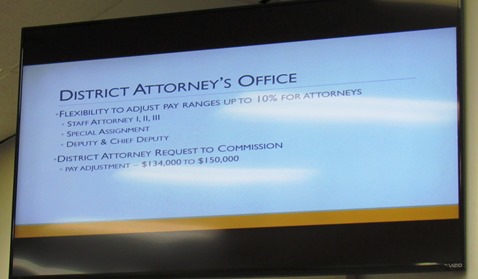
Pay raise for district attorney and staff
The UG Commission, in Monday night’s budget workshop, also discussed a compromise on giving the Wyandotte County district attorney and his staff a raise.
The pay raise was negotiated between the UG administration and district attorney, according to UG officials.
Bach said the UG did a compensation study in 2015, and he has already addressed pay differences for the Sheriff command, the Juvenile Detention Center, the appraiser’s office and public works and engineering. He said he was currently working on compensation for the district attorney’s office and water pollution control.
Bach said there was money in the existing budget to use for the pay changes.
He recommended flexibility to adjust pay ranges up to 10 percent for attorneys, including levels one through three of staff attorneys, special assignment, deputy and chief deputy attorneys.
Dupree, an elected official who has been in office for six months, requested a pay increase for himself from $134,000 to $150,000, a $16,000 salary increase, according to Bach. He said this decision was up to the commission, without his recommendation.
Commissioner Walker, who originally brought up the idea of increasing salaries in the district attorney’s office, said the plan has the potential to create the dynamic. Walker said the previous district attorney had been there 11 years, and when he left office, he was making about $133,000 or $134,000.
“I’m not opposed to a reasonable increase for Mr. Dupree,” Walker said. “I don’t believe the Wyandotte County district attorney should be the lowest paid district attorney, nor do I believe he should be the highest paid.”
He said an increase of $16,000 is really not reasonable after six months, but the salary should have been higher than it was, and he is not sure why it was never pursued earlier to move it up higher. He thought an increase closer to $8,000 would have been better.
Walker said his idea was originally to provide a way to keep experienced staff attorneys here by offering salaries that were comparable to other counties.
Bach said if a staff attorney was making $53,000, a 10 percent pay raise would be about $5,300 more a year.
“I don’t have a problem with them getting what they should have, I just don’t want to see it inequitable,” said Commissioner Jane Philbrook, who suggested a $6,000 raise, or about 5 percent, for the district attorney.
A 10 percent raise for all of the attorneys would mean $150,000 more for the department, Bach said.
Commissioner Johnson asked for more information about caseload per assistant district attorney and how it compared to other jurisdictions.
Commissioner Gayle Townsend said that something added to the district attorney’s base pay would be warranted, based on the approach he’s taking to his job, not just sitting and waiting for a crime to come to him, and also engaging proactively with his staff.
Commissioner Brian McKiernan said he was concerned a little bit if one department was considered in isolation from the other departments.
Bach said they did an analysis, then started working through different departments on adjusting pay.
McKiernan said if this is a process that has already begun and this is another step in an ongoing process, then he has fewer reservations about it.
Commissioner Kane said he has noticed that the district attorney and his staff are involved in the community.
The top UG legal attorney is making around $140,000, according to Bach. Kane said both the district attorney and the top UG chief legal counsel should be making about the same amount.
Commissioner Angela Markley wondered where the money for the pay increases would come from. Bach said there were currently three clerical vacancies in the district attorney’s office, and Dupree would look at one of those or more to help create the funds for the raises.
Mayor Holland said there was a consensus that salaries should be raised in the district attorney’s office, and he has heard a consensus of a 5 percent raise for the district attorney, which would bring the salary to about $140,000. Commissioner Markley suggested adding a provision that the budget changes for the district attorney’s office not go over the $150,000 threshold, which was agreed to.
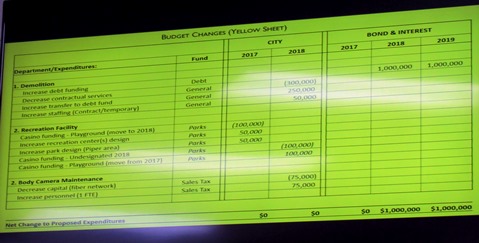
PILOT tax to stay the same, sewer tax to increase under proposed budget
An effort by Commissioner Walker to reduce the UG’s PILOT (payment in lieu of taxes) fee of 11.9 percent on Board of Public Utilities’ bills also did not advance at Monday night’s budget meeting.
Commissioner Hal Walker said, “Once again, we have done nothing over the course of the last year to reduce our dependence on PILOT. We pay one of the highest PILOT fees in the United States of America. The PILOT fee is really a franchise fee.”
Every percent of the PILOT fee is about $3.3 million, he said. The PILOT fee was raised because of an economic downturn in 2008, and officials then said they would begin reducing it after three years to what it had been, but it is the same as last year.
“Here we are, once again, we’ve become dependent, just like an addict, we cannot break our addiction to this revenue stream, and we’re not willing to suffer the pain or consequences that go with it, because now, we’re hooked in the throes of a monetary opioid addiction. I will not vote in favor of this again and I have not voted in favor of it any year that we’ve been here,” Walker said.
Mayor Holland said other utility customers, such as KCPL, also pay franchise fees that are typically about 5 percent. KCPL pays property taxes on its property and equipment, and also pays dividends to shareholders, which BPU does not pay, he said. Adding that all up, KCPL totals more than 12 percent, he said.
He said the BPU PILOT was not too high. “When you take in the adjustment for property taxes and dividend shareholders, the customers of BPU with this PILOT are paying a commensurate component that other utility customers are paying,” Holland said.
He also said major entities in the city, including the schools, churches and University of Kansas Medical Center, do not pay property taxes but they want emergency services, roads and sewers.
“This is a way the non-property taxpaying entities contribute to the overall services of our city,” Holland said.
Also, he said 65 percent of the PILOT fee is paid by businesses and 35 percent is paid by residential customers. With the property tax, commercial pays 50 percent and residential pays 50 percent. The property tax reduction of 2 mills this year and 2 mills last year is relief that will be better seen on the residential side, he said.
Commissioner Melissa Bynum asked for a meeting later in the year comparing other utilities’ franchise fees, and finding out if it is legal to charge different rates for residential and commercial.
For many years, Walker said the PILOT fee of 5 to 7 percent was enough, but it was only when the UG was in economic straits that it decided to increase it. Now the UG is saying it’s justified because of taxes.
“What’s not said, and what troubles me even more, is if the BPU raises rates, we don’t lower our PILOT,” Walker said. “We don’t say enough, you gave us enough last year, we take whatever percentage, whatever they increase their rates, we get a percentage of.”
That has no relationship to the taxation issue or to contribution, he said. He also said the UG has delegated the responsibility to BPU of maintaining fire hydrants and maintaining signal lights.
“It isn’t the BPU paying this,” Walker said. “It’s you and me and everybody else. There are a lot of people who can’t pay their light bills.”
Holland noted the UG receives electricity at no cost from the BPU, and it has never seen how much it is worth. He said it would be worth looking at a flat fee, instead of a percentage, to cover services for non-taxpaying entities. He said there is reason to review it later in the year, find out the total benefit, and do a cost comparison to multiple entities.
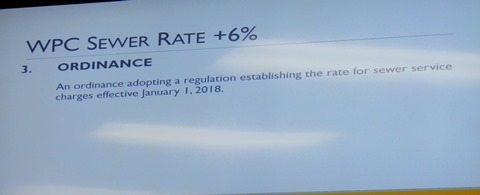
The UG budget includes a 6 percent increase on the water pollution control sewer rate, starting in January 2018. These charges are found on the BPU bill.
UG officials said the water pollution control charge increases are due to actions by the federal government to clean up the water released by the UG into the river. According to Holland, given the lower-income status of the community, the UG often needs more time to fix the problem than what the federal government wants to give it.
UG may go into debt to demolish blighted structures
The UG budget also is proposed to change on spending to demolish some of the 200 houses that are on the list for demolition. On demolition, after reviewing a proposal with staff, Bach said $2 million to spend in one year was a tall order, and so the UG is now looking at doing a $1 million bond in 2018, then follow it with another $1 million bond in 2019.
This is a debt-financed project, he said. In order to cover the debt, for 2017, the UG would increase its demolition cash money by $300,000, Bach said. The UG now would be increasing the demolition funds by $2 million, but taking away $300,000 from general operating funds and moving $250,000 to service the debt, he said. The $2 million will be paid over a 10-year time, or less, he said. A temporary staff position for two years will be needed, moving an administrative assistant to work with it.
Commissioner Hal Walker suggested that demolition would be more efficient and cost-effective by contracting with one company for all demolition than contracting with six or more companies. The idea was supported by Mayor Mark Holland and Commissioner Angela Markley.
Commissioner Brian McKiernan said he supports this issue, and also the UG has to stop the inflow of properties into the demolition status. Commissioners discussed how the home values in a neighborhood are reduced when there is a house that has deteriorated and is blighted in the neighborhood.
“The SOAR (blight reduction) program is going to pay for itself by growing value in our community,” Mayor Holland said.
Commissioner Jane Philbrook pointed out that just because a house is boarded up, it is not necessarily blighted. The house might just be going through a legal process at the time, she added, and might not be classified as blighted. Bach said the UG is now trying to get to some homes right away and board them before more deterioration can happen, in order to save them.
Police body camera expenses
Bach said he was moving some funding around for body camera maintenance expenses. A full-time employee position was added to the budget for this program. Although the funding was included in the maintenance expenses, it needed to be under personnel for 2018, according to officials.
Mayor Mark Holland said a full-time employee may be needed to be added to the district attorney’s staff for the 2019 budget to handle the body camera data.
“Every court case from 2019 on out is going to have video,” he said. There was a $75,000 expense for the position.
“Given that the body cameras on a limited basis serve some beneficial purpose, do we need to spend a million dollars for a separate network for them?” Commissioner Walker asked.
“I’m unpersuaded,” Commissioner Walker said. He said information would need to be retained and docketed into a separate system under this plan.
“I think that’s a waste of money until we’re somewhere down the road and we can justify it with evidence that the other way is not working,” Walker said.
Holland said he was persuaded by it, and based on the presentation, the UG is leveraging the investment with the police fiber network for a much larger fiber network for the community for economic development and other things. He said it would be an asset to pay the UG back through economic development and other efficiencies.
“It’s very cutting-edge and a lot of communities are doing it that are forward-thinking,” Holland said. Other cities that Kansas City, Kansas, competes with for business and talent are building networks, he said.
No binding votes were taken Monday night, but there was a consensus reached on many items at the workshop. The budget is scheduled for adoption at 7 p.m. Thursday, July 27, at a meeting at City Hall, 701 N. 7th St., Kansas City, Kansas.
More details about Monday’s meeting may be viewed on the UG’s YouTube channel at https://www.youtube.com/watch?v=v4To39JD0Xo.

A video of the later, budget workshop (after the public hearing), is still not available on YouTube.
Yes, it was not posted right away, but it was posted later on YouTube. They made a video, and that meeting was shown live on UGTV on Spectrum Cable (Channel 2) and Google TV (Channel 141). It is scheduled to be replayed around 9:49 a.m. Wednesday on UGTV (although I’m not sure that I can read this time correctly on their schedule). It is now online on YouTube at https://www.youtube.com/watch?v=u9SK00PLojo.